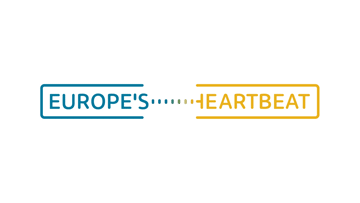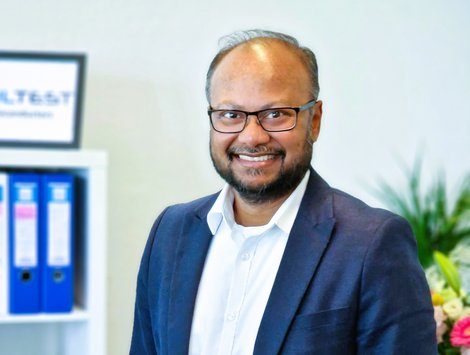Semiconductors are the unseen heroes of our time. Found in smartphones, computers, cars and countless other devices, they are essential to our modern lives. But reliance on semiconductors from Asia has posed significant challenges to the global economy in recent years. This makes it all the more important to develop our own solutions.
This is exactly where SilTest Semiconductors GmbH, a young startup based in the Kleve Technology Center, comes in. The company is geared to the development of special chips and the implementation of test procedures for semiconductors. With this focus, SilTest stands out in Germany while offering customized solutions – from planning to production.
In an interview with NRW.Global Business, Sameer Saran, founder and Managing Director of SilTest, talks about the company's vision and the potential of NRW as a location for the semiconductor industry. He also explains that the shortage of skilled workers is a major challenge for the industry and how he and his company plan to remedy the situation.
- Mr. Saran, how would you explain to a layperson what semiconductors are and why they are so important for our economy?
Saran: Semiconductors are the powerful brains behind much of our modern technology, from smartphones to cars to medical devices. They are essential because they control the flow of electricity in electronic devices and ensure that they work efficiently. Semiconductors are the backbone of modern technology, so to speak, underpinning virtually every aspect of our digital lives.
The German government's recognition of semiconductors as the "raw material of the 21st century" underscores their critical role in economic growth, innovation and national competitiveness. Just as raw materials such as coal, iron and oil powered the industrial revolutions of the past, semiconductors are the foundation of today's digital revolution. They facilitate advances in artificial intelligence, autonomous vehicles, renewable energy, healthcare and more.
- And you now want to strengthen this important sector in Germany. What exactly does your company have to offer?
Saran: Our offering currently consists of two main pillars: Engineering Services and Tools & Automation. In Engineering Services, we help companies bridge the gap between lab and fab, providing solutions for the post-silicon development phase – from product development, testing and production optimization to managing production ramp-up, scaling and logistics. In the Tools & Automation area, we provide analysis software that simplifies the development of high-quality and profitable semiconductor products or test procedures. This reduces costs and shortens production phases. Every chip that comes to market must be tested as quickly and reliably as possible. Developing such a test solution for mass production requires skills and experience that our team possesses.
We have a clear focus on small and medium-sized enterprises (SMEs). While large companies usually have an established supplier network and the necessary financial resources, SMEs generally lack access to key technologies and suppliers in Europe. We want to work with these small and medium-sized chip design companies in NRW, Germany and the rest of Europe to help them bring high-quality products to market faster.
- What are the greatest challenges in semiconductor manufacturing?
Saran: Chip manufacturing is probably one of the most complex operations in the supply chain. Imagine putting together a million-piece puzzle under a microscope. Even a tiny error can throw the whole thing off, making production complex and demanding. This complexity, combined with the constant demand for faster and more efficient chips, poses a constant challenge for semiconductor manufacturers.
Another issue is material wastage and energy consumption. Sophisticated tools, such as our YieldOptiX data analysis software, are required to sort out the faulty chips efficiently. And the lack of qualified specialists also plays a part here.
- You mention the shortage of skilled labor. What exactly is the situation in the industry? What are the reasons for this?
Saran: Demand is huge. There is currently a shortage of more than 100,000 qualified semiconductor specialists in Europe. According to the German Electrical and Electronic Manufacturers' Association, around one-third of German semiconductor specialists will retire in the next ten years. We have noticed this ourselves: When we advertise vacancies, there are hardly any applications from Germany. We have been lucky, but it takes several months or even years to fill key positions throughout the industry.
I believe there are many reasons for this. First of all, it's early education; high school students don't see technical majors as attractive. We need to start there and show them how cool it can be, what impact they can have on the world by working in the technology industry. The second reason is the lack of chip design and test courses at universities. The Dresden University of Technology sends students to Taiwan to study chip design. Why don't we set up special courses at German universities?
- You took a different approach and founded an academy. Why did you do this?
Saran: Europe will need several thousand semiconductor specialists in the coming years. This calls for creative solutions. We founded the SilTest Academy to train our own engineers because there is no facility in Germany where chip testing is taught from scratch. Our academy started as an internal training program for our new employees. But then we thought: Why not open it up to others? Our vision is to become a leading training center for several key skills in the European semiconductor industry. In the future, we will offer more courses as part of the SilTest Academy, and we are also open to partnering with other universities or companies to further develop our offerings and make them available to prospective specialists.
- Why did you choose NRW as your location? What advantages does the location offer for startups in particular?
Saran: First of all, I chose NRW because of its location. The proximity to several high-tech companies within NRW and across the border in the Netherlands is definitely an advantage, and we have already been able to acquire some of them as customers. The region is also well connected to the rest of Europe by air, which is very important for us.
Second, NRW offers a cost advantage compared to large cities such as Munich. This enables us to attract top talent and pay competitive salaries.
And the third benefit I would mention is the thriving startup ecosystem. We are in touch with startups in the same field and can benefit from their experience – for example, when it comes to finding partners and customers. In NRW, there is a wide range of forums, meet-ups and conferences for startups, as well as a well-connected financial funding system, which is crucial for any successful venture.
- What potential does NRW have to become an important location for the semiconductor and chip industry? What are its strengths?
Saran: For a region to be successful in this industry, a number of things need to be in place, including favorable regulation, access to key suppliers of materials and technologies, suitable sites, excellent infrastructure such as roads, ports and airports, affordable utilities such as water and electricity, good universities, and access to financing. NRW meets several of these criteria. So I think all the ingredients are there for NRW to play a key role in the industry.
However, realizing this potential will require targeted efforts to attract a wide range of companies, from large corporations to small and medium-sized innovators and suppliers. If we focus on creating a supportive ecosystem, NRW can indeed become a major center for the semiconductor and chip industry.
- What are SilTest's long-term goals and visions?
Saran: SilTest's long-term vision is to act as a link between product development teams and major manufacturers. We want to become a strategic development partner for our customers, offering state-of-the-art test and qualification solutions for a wide range of chips, including new technologies such as photonics, silicon carbide and gallium nitride. Our next step is to establish a research laboratory dedicated to the development of new test and efficient production methods for all types of chips.
- Mr. Saran, thank you very much for speaking with us!


